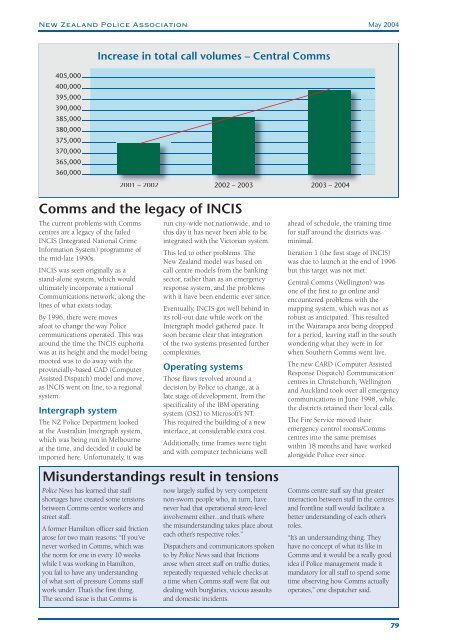Police News May - New Zealand Police Association
Police News May - New Zealand Police Association
Police News May - New Zealand Police Association
You also want an ePaper? Increase the reach of your titles
YUMPU automatically turns print PDFs into web optimized ePapers that Google loves.
<strong>New</strong> <strong>Zealand</strong> <strong>Police</strong> <strong>Association</strong><strong>May</strong> 2004Increase in total call volumes – Central Comms405,000400,000395,000390,000385,000380,000375,000370,000365,000360,0002002 – 2003 2003 – 2004Comms and the legacy of INCISThe current problems with Commscentres are a legacy of the failedINCIS (Integrated National CrimeInformation System) programme ofthe mid-late 1990s.INCIS was seen originally as astand-alone system, which wouldultimately incorporate a nationalCommunications network, along thelines of what exists today.By 1996, there were movesafoot to change the way <strong>Police</strong>communications operated. This wasaround the time the INCIS euphoriawas at its height and the model beingmooted was to do away with theprovincially-based CAD (ComputerAssisted Dispatch) model and move,as INCIS went on line, to a regionalsystem.Intergraph systemThe NZ <strong>Police</strong> Department lookedat the Australian Intergraph system,which was being run in Melbourneat the time, and decided it could beimported here. Unfortunately, it wasrun city-wide not nationwide, and tothis day it has never been able to beintegrated with the Victorian system.This led to other problems. The<strong>New</strong> <strong>Zealand</strong> model was based oncall centre models from the bankingsector, rather than as an emergencyresponse system, and the problemswith it have been endemic ever since.Eventually, INCIS got well behind inits roll-out date while work on theIntergraph model gathered pace. Itsoon became clear that integrationof the two systems presented furthercomplexities.Operating systemsThose flaws revolved around adecision by <strong>Police</strong> to change, at alate stage of development, from thespecificality of the IBM operatingsystem (OS2) to Microsoft’s NT.This required the building of a newinterface, at considerable extra cost.Additionally, time frames were tightand with computer technicians wellMisunderstandings result in tensions<strong>Police</strong> <strong><strong>New</strong>s</strong> has learned that staffshortages have created some tensionsbetween Comms centre workers andstreet staff.A former Hamilton officer said frictionarose for two main reasons: “If you’venever worked in Comms, which wasthe norm for one in every 10 weekswhile I was working in Hamilton,you fail to have any understandingof what sort of pressure Comms staffwork under. That’s the first thing.The second issue is that Comms isnow largely staffed by very competentnon-sworn people who, in turn, havenever had that operational street-levelinvolvement either...and that’s wherethe misunderstanding takes place abouteach other’s respective roles.”Dispatchers and communicators spokento by <strong>Police</strong> <strong><strong>New</strong>s</strong> said that frictionsarose when street staff on traffic duties,repeatedly requested vehicle checks ata time when Comms staff were flat outdealing with burglaries, vicious assaultsand domestic incidents.ahead of schedule, the training timefor staff around the districts wasminimal.Iteration 1 (the first stage of INCIS)was due to launch at the end of 1996but this target was not met.Central Comms (Wellington) wasone of the first to go online andencountered problems with themapping system, which was not asrobust as anticipated. This resultedin the Wairarapa area being droppedfor a period, leaving staff in the southwondering what they were in forwhen Southern Comms went live.The new CARD (Computer AssistedResponse Dispatch) Communicationcentres in Christchurch, Wellingtonand Auckland took over all emergencycommunications in June 1998, whilethe districts retained their local calls.The Fire Service moved theiremergency control rooms/Commscentres into the same premiseswithin 18 months and have workedalongside <strong>Police</strong> ever since.Comms centre staff say that greaterinteraction between staff in the centresand frontline staff would facilitate abetter understanding of each other’sroles.“It’s an understanding thing. Theyhave no concept of what its like inComms and it would be a really goodidea if <strong>Police</strong> management made itmandatory for all staff to spend sometime observing how Comms actuallyoperates,” one dispatcher said.79
















